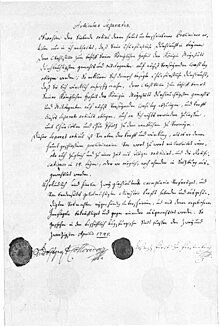Peace of Feet
The Peace of Füssen was a peace treaty concluded in Füssen on April 22, 1745 between Bavaria and Austria . The peace was made during the Austrian War of Succession and ended the state of war between the two states.
history
After the capture of Prague by Bavarian and French troops on November 26, 1741 during the War of the Austrian Succession, Karl Albrecht of Bavaria received homage as King of Bohemia . Just a few weeks later, on January 24, 1742, he was unanimously elected as Roman-German Emperor Charles VII. But on the day of his coronation , on February 12, 1742, Bavaria was occupied by Austrian troops and his Munich residence was plundered by Hungarian hussars . One day later, Karl wrote in his diary:
- “My coronation took place yesterday, with a splendor and cheer beyond compare, but at the same time I saw myself attacked by stone pains and gout pains. Sick, without land, without money, I can truly compare myself to job , the man of pain [...] "
After changing fortunes in the war and the transfer of England to the Austrian side in 1743, the balance of power changed decisively in favor of Austria and her monarch Maria Theresa . The opening of the Second Silesian War by the Prussian King Friedrich II. In August 1744 brought only a short break for Bavaria, as Austrian troops entered Silesia and Bavaria a short time later . Emperor Charles VII barely escaped capture. He died on January 20, 1745 in Munich, which had been recaptured by Bavarian troops a few days earlier.
After the death of Emperor Charles VII, his son and successor, Elector Maximilian III. Joseph immediately entered into peace negotiations in April 1745 after the lost battle at Pfaffenhofen and a preliminary peace was concluded . The preliminary peace was then confirmed by mutual ratifications as a definitive peace .
content
The peace treaty consisted of 17 articles, two separate articles and a secret additional clause.
In this peace treaty, Bavaria renounced the inheritance claims and recognized the pragmatic sanction . Austria for its part waived war indemnities, withdrew all troops from Bavaria and retrospectively recognized the imperial dignity of Charles VII. Elector Max III. Joseph promised to support the election of Franz Stephan (the husband of Maria Theresa) and to win the Electoral Palatinate and Electoral Cologne , who were also ruled by Wittelsbachers , for it.
The contract was signed on April 22nd, 1745 in Füssen by the Bavarian agent Joseph Fürst zu Fürstenberg and the Austrian negotiator Rudolph Joseph von Colloredo-Waldsee .
literature
- Heinrich Pleticha (Hrsg.): German history - Enlightenment and end of the German empire. (Volume 8) Bertelsmann, Gütersloh 1993; ISBN 3-570-03762-2 .
- Georg Friedrich Preuss : The Peace of Füssen 1745. Historical treatise booklet 6. Munich / Lüneburg 1896.
- Franz Ehgartner: The beginning of the reign of Elector Maximilian III. Joseph von Bayern - A Contribution to the History of the Peace of Füssen (1745). (Diss.) Ludwig Maximilians University, Munich 1910.
- Hugo Siefert: It is green Bavaria and nothing like the tallest house in Austria - with the help of Donaueschingen, the Peace of Füssen is achieved in 1745. In: Schriften der Baar. Volume 51, Donaueschingen 2008, pp. 17–30 online (PDF file; 36.05 MB)
- The grave of the Frankfurt Union. From a patriotic German. Frankfurt and Leipzig 1745, download: https://download.digitale-sammlungen.de/BOOKS/download.pl?id=bsb10886207
Web links
- Entry on the Peace of Füssen in the Austria Forum (in the AEIOU Austria Lexicon )
- 1745 IV 22 peace preliminaries from Füssen. Contract text. Leibniz Institute for European History . Retrieved June 26, 2016 .
